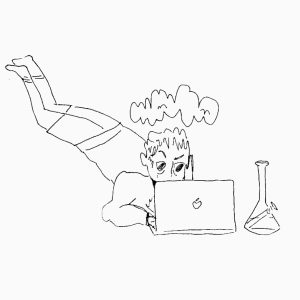College students are using marijuana more than ever, and as its popularity grows, so do concerns over the drug’s effects on student brain health and academic performance.
Since 1975, the Monitoring the Future study, an annual report funded by the National Institute on Drug Abuse, has been tracking substance use and behaviors among young adults ages 19-22. In 2020, marijuana use among college students reached an all time high with 44% of students reporting use in the past year, a 6% increase from 2015.
Factors contributing to increased recreational and medicinal usage include increasing state legalization, decreasing negative stigma, and surges in mental health disorders associated with the COVID-19 pandemic.
A study published in “Cannabis and Cannabinoid Research” found changes in lifestyle, psychosocial stressors, and mental health as common contributing factors towards increased cannabis use during the COVID-19 pandemic.
Over the last decade, increased media coverage and social media chatter about the therapeutic value of marijuana has decreased negative stigma associated with the drug. As of today, 37 states have legalized medicinal marijuana. Of these states, 19 have legalized recreational use. While issues of legality are certainly decreasing, negative attitudes are still present and strong.

Kyle [omitted], an engineering major student at City College, ingests marijuana legally and strongly believes in the drugs positive medicinal properties, but asked to have his last name omitted as he is applying for admission to some of the country’s top schools, including MIT.
He consumes marijuana gummies twice weekly for increased academic performance. Kyle finds the psychoactive effects of marijuana to not only be therapeutic, but performance enhancing. While under the influence of THC, Kyle is “more connected to his thoughts” and immersed in lectures and course material.
It took time for the 20 year old to determine an appropriate dosage for himself. At first, Kyle only used the drug recreationally and would consume upwards of 50mg to achieve desired effects. He now takes just 1mg of THC at a given time; a relatively low dose, especially among regular users.
City College Psychology professor Leida Tolentino said this increased performance could be attributed to the way the dominant psychoactive chemical in marijuana, tetrahydrocannabinol, acts on the neurotransmitter dopamine. A neurotransmitter is a chemical messenger which allows nerve cells to communicate with each other.
“It’s not just the stereotypical pleasure neurons that we hear about in pop culture. Dopamine is a neurotransmitter that subserves functions as varied as mental focus, pleasure and reward, motivation more than anything, as well as movement– motor action,” Tolentino said. “Dopamine is involved in regulating all these functions, and it certainly has a pleasurable motivating effect. So it can promote action towards a particular goal or could perhaps increase focus.”

Maya Long, a 20-year-old biology major student at City College, is a heavy user, smoking marijuana for medicinal and recreational purposes almost daily.
“It gets me in the headspace to really dive deep into something, to not procrastinate, and be interested in it,” Long said.
For most students heavy marijuana usage will likely hinder academic achievement. Published studies have shown that post-secondary students who use the drug often have lower GPAs, skip class more often, and take longer to graduate. This is because of the way marijuana acts on the brain.
When inhaled or consumed, THC binds to receptors in the nervous system called cannabinoid receptors. These receptors are responsible for attentiveness and memory retention, areas of the brain a student would normally not want disrupted or impeded.
While research is still being conducted on the long term consequences of marijuana usage on the nervous system, most research points to the effects being non permanent. For most, normal brain function returns after a prolonged period of abstinence.
Still, for some people, marijuana use can pose a serious threat to mental health. Many studies have linked its use to psychosis (schizophrenia), depression, and anxiety. One study concluded that eliminating marijuana use among adolescents would decrease global rates of schizophrenia by 10%.
“Marijuana is a drug that has effects as varied as the individuals that use them,” Tolentino said. “It can certainly have harmful effects, especially for susceptible individuals, but it can also have a host of benefits.”










![Milton Alejandro Lopez Plascencia holds a flag showcasing the United States and Mexico on Feb. 7 in Santa Barbara, Calif. “It’s heartbreaking to see what is happening all across the country,” Lopez Plascencia said. “I [want] my voice to be heard by the community.”](https://www.thechannels.org/wp-content/uploads/2025/05/MGSImmigration-1-1200x800.jpg)









